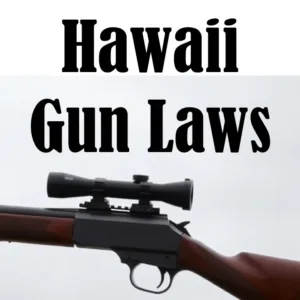Hawaii has some of the most restrictive gun laws in the United States, with strict requirements for purchasing, carrying, and storing firearms. The state enforces comprehensive regulations, including mandatory registration, licensing, and specific prohibitions on certain types of firearms. This guide will cover Hawaii’s gun laws, including purchasing procedures, permit requirements, open and concealed carry, firearm restrictions, self-defense laws, and prohibited locations for carrying firearms.
Hawaii Gun Laws Overview

Purchasing Firearms in Hawaii
Hawaii requires that all firearm purchasers go through a rigorous registration and licensing process. Purchasers must obtain a permit to acquire each firearm, pass a background check, and meet additional requirements.
Key Requirements:
- Permit to Acquire: Hawaii requires a separate permit for each firearm purchase. Permits are issued by the police department and require a waiting period.
- Waiting Period: A 14-day waiting period applies for firearm purchases.
- Minimum Age: You must be at least 21 to purchase handguns and long guns.
- Registration Requirement: All firearms in Hawaii must be registered with the local police within five days of purchase, even for those brought into the state by new residents.
Firearm Registration
Hawaii mandates the registration of all firearms. Every newly acquired firearm, including those transferred between private parties, must be registered with the local police department.
Registration Process:
- Obtain a Permit to Acquire: Each firearm purchase requires its own permit to acquire, available from local law enforcement.
- Registration Within 5 Days: Register all firearms with the police department within five days of acquisition or arrival in the state.
- Background Check: Required for each registration, ensuring no disqualifying convictions or mental health issues.
Open Carry in Hawaii
Open carry of firearms is prohibited in Hawaii for most civilians. Only law enforcement and select individuals with specific permits may open carry, and even these are rare.
Concealed Carry in Hawaii
Hawaii is a “may-issue” state with extremely restrictive concealed carry policies. Concealed carry permits are seldom granted to civilians, as law enforcement authorities retain discretion over issuing them. Hawaii’s concealed carry permits require substantial evidence of the need for self-defense, and few individuals meet the stringent criteria.
How to Obtain a Concealed Carry Permit:
- Eligibility Requirements: Applicants must demonstrate a substantial reason for self-defense, generally beyond what most civilians experience.
- Training Requirement: Hawaii mandates firearms safety training as part of the concealed carry permit application.
- Application and Approval: Submit applications to the county police department, but approvals are highly discretionary.
Assault Weapons and Magazine Capacity Restrictions
Hawaii has strict regulations on firearms, including a ban on assault weapons and limits on magazine capacity for certain firearms.
- Assault Weapons Ban: Hawaii prohibits specific firearms classified as “assault weapons.” Firearms with features such as pistol grips, flash suppressors, and folding stocks may be classified as restricted.
- Magazine Capacity Limit: Hawaii restricts magazines to a maximum of 10 rounds for handguns. Magazines exceeding this limit are generally illegal in Hawaii, with few exceptions.
Restricted Locations for Carrying Firearms in Hawaii
Hawaii has clear restrictions on where firearms are permitted, regardless of whether individuals have a permit. Firearms are generally not allowed in public spaces, government buildings, or educational institutions.
- Schools: Firearms are strictly prohibited on K-12 school properties and university campuses.
- Government Buildings: Most government offices and facilities do not allow firearms on the premises.
- Public Gatherings: Certain public spaces and events may restrict firearms; local ordinances may apply.
- Private Property: Private property owners can post signs prohibiting firearms, and these must be adhered to by gun owners.
Self-Defense Laws in Hawaii: Duty to Retreat
Hawaii has strict self-defense laws that follow a duty to retreat in public areas. This means individuals are expected to avoid confrontations and withdraw if it is safe to do so. Hawaii does not have a Stand Your Ground law, even within one’s own home.
Duty to Retreat
In Hawaii, the duty to retreat is required if it can be done safely. Deadly force is only permitted when there is a clear and imminent threat that cannot be avoided, and only when no other option is available.
Castle Doctrine
Hawaii has a limited Castle Doctrine. While there is a right to defend oneself in one’s own home, using deadly force is only justifiable if there is no alternative and imminent harm is unavoidable.
Firearms Prohibited Persons in Hawaii
Hawaii restricts firearm ownership for individuals who meet certain prohibitions, including criminal backgrounds or specific mental health conditions.
- Convicted Felons: Individuals with felony convictions are generally prohibited from owning firearms.
- Domestic Violence Offenders: Convictions related to domestic violence disqualify individuals from firearm ownership.
- Mental Health Restrictions: Individuals deemed mentally incompetent or who have been committed to mental institutions are restricted from firearm possession.
- Protective Orders: Persons subject to active restraining or protective orders may not own or purchase firearms.
Reciprocity with Other States
Hawaii does not recognize concealed carry permits from other states. Non-residents and visitors must abide by Hawaii’s restrictive gun laws, as there is no legal avenue for concealed or open carry for most civilians.
Penalties for Violating Gun Laws in Hawaii
Violations of Hawaii’s gun laws can result in severe legal consequences, including fines, jail time, and forfeiture of firearms. Common violations include:
- Unregistered Firearms: Possessing or failing to register a firearm within the five-day window can lead to criminal charges.
- Unlawful Carry: Carrying a concealed or open weapon without a permit is punishable by law.
- Possession of Prohibited Firearms or Magazines: Possessing firearms classified as assault weapons or magazines exceeding the 10-round limit can result in significant penalties.
Conclusion: Navigating Hawaii’s Gun Laws
Hawaii’s restrictive gun laws focus on maintaining public safety while enforcing strict guidelines for firearm ownership, carrying, and registration. Understanding Hawaii’s requirements, including the duty to register all firearms, prohibitions on certain weapons, and stringent concealed carry requirements, is crucial for residents and visitors alike. By adhering to Hawaii’s gun laws, individuals can ensure they are responsibly and legally handling firearms within the state.
FAQs About Gun Laws in Hawaii
1. Do I need a permit to buy a gun in Hawaii?
Yes, Hawaii requires a permit to acquire each firearm, along with a 14-day waiting period.
2. What are Hawaii’s magazine capacity limits?
Magazines are limited to a maximum of 10 rounds for handguns.
3. Does Hawaii recognize concealed carry permits from other states?
No, Hawaii does not honor concealed carry permits issued by any other state.
4. Is open carry allowed in Hawaii?
No, open carry is not permitted for civilians in Hawaii.
5. What are Hawaii’s self-defense laws?
Hawaii enforces a duty to retreat, requiring individuals to avoid confrontation in public if possible. The Castle Doctrine allows limited use of force in the home under specific circumstances.
